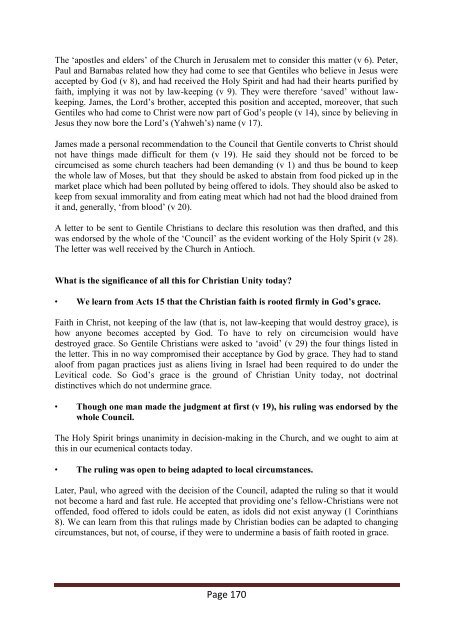Digging Out the Embedded Church - The Maranatha Community
Digging Out the Embedded Church - The Maranatha Community
Digging Out the Embedded Church - The Maranatha Community
Create successful ePaper yourself
Turn your PDF publications into a flip-book with our unique Google optimized e-Paper software.
<strong>The</strong> „apostles and elders‟ of <strong>the</strong> <strong>Church</strong> in Jerusalem met to consider this matter (v 6). Peter,<br />
Paul and Barnabas related how <strong>the</strong>y had come to see that Gentiles who believe in Jesus were<br />
accepted by God (v 8), and had received <strong>the</strong> Holy Spirit and had had <strong>the</strong>ir hearts purified by<br />
faith, implying it was not by law-keeping (v 9). <strong>The</strong>y were <strong>the</strong>refore „saved‟ without lawkeeping.<br />
James, <strong>the</strong> Lord‟s bro<strong>the</strong>r, accepted this position and accepted, moreover, that such<br />
Gentiles who had come to Christ were now part of God‟s people (v 14), since by believing in<br />
Jesus <strong>the</strong>y now bore <strong>the</strong> Lord‟s (Yahweh‟s) name (v 17).<br />
James made a personal recommendation to <strong>the</strong> Council that Gentile converts to Christ should<br />
not have things made difficult for <strong>the</strong>m (v 19). He said <strong>the</strong>y should not be forced to be<br />
circumcised as some church teachers had been demanding (v 1) and thus be bound to keep<br />
<strong>the</strong> whole law of Moses, but that <strong>the</strong>y should be asked to abstain from food picked up in <strong>the</strong><br />
market place which had been polluted by being offered to idols. <strong>The</strong>y should also be asked to<br />
keep from sexual immorality and from eating meat which had not had <strong>the</strong> blood drained from<br />
it and, generally, „from blood‟ (v 20).<br />
A letter to be sent to Gentile Christians to declare this resolution was <strong>the</strong>n drafted, and this<br />
was endorsed by <strong>the</strong> whole of <strong>the</strong> „Council‟ as <strong>the</strong> evident working of <strong>the</strong> Holy Spirit (v 28).<br />
<strong>The</strong> letter was well received by <strong>the</strong> <strong>Church</strong> in Antioch.<br />
What is <strong>the</strong> significance of all this for Christian Unity today?<br />
• We learn from Acts 15 that <strong>the</strong> Christian faith is rooted firmly in God’s grace.<br />
Faith in Christ, not keeping of <strong>the</strong> law (that is, not law-keeping that would destroy grace), is<br />
how anyone becomes accepted by God. To have to rely on circumcision would have<br />
destroyed grace. So Gentile Christians were asked to „avoid‟ (v 29) <strong>the</strong> four things listed in<br />
<strong>the</strong> letter. This in no way compromised <strong>the</strong>ir acceptance by God by grace. <strong>The</strong>y had to stand<br />
aloof from pagan practices just as aliens living in Israel had been required to do under <strong>the</strong><br />
Levitical code. So God‟s grace is <strong>the</strong> ground of Christian Unity today, not doctrinal<br />
distinctives which do not undermine grace.<br />
• Though one man made <strong>the</strong> judgment at first (v 19), his ruling was endorsed by <strong>the</strong><br />
whole Council.<br />
<strong>The</strong> Holy Spirit brings unanimity in decision-making in <strong>the</strong> <strong>Church</strong>, and we ought to aim at<br />
this in our ecumenical contacts today.<br />
• <strong>The</strong> ruling was open to being adapted to local circumstances.<br />
Later, Paul, who agreed with <strong>the</strong> decision of <strong>the</strong> Council, adapted <strong>the</strong> ruling so that it would<br />
not become a hard and fast rule. He accepted that providing one‟s fellow-Christians were not<br />
offended, food offered to idols could be eaten, as idols did not exist anyway (1 Corinthians<br />
8). We can learn from this that rulings made by Christian bodies can be adapted to changing<br />
circumstances, but not, of course, if <strong>the</strong>y were to undermine a basis of faith rooted in grace.<br />
Page 170








